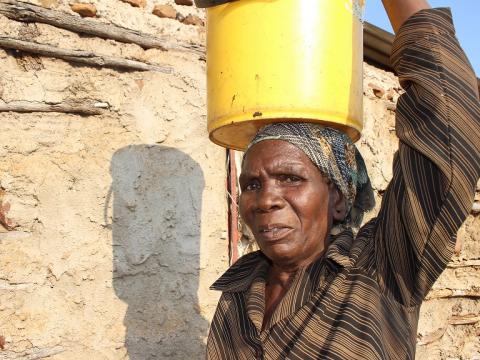In Swaziland, people dig for water as El Nino dries up rivers

By Zanele Faith Dlamini, Swaziland Communications
Mhlatuze River used to be one of the biggest rivers in Swaziland. People from this community just dig on the sand and they get water for daily use.
Over the years as the drought intensified, the water flow was affected and eventually it dried up. In desperation, people from Ngozi community tried to find a way to survive. They keep on digging as deep as they can until the water comes up. This water is used by the people, as well as animals such as their herd of cattle.
Phahlakati Tsabedze, 78, lives with her grandchild Nosimilo Mamba, 9. Nosimilo was abandoned by her mother when she was still very young and was left in the care of her grandma who took the responsibility of sending her to school and providing for her needs. Phahlakati’s husband died several years.
For Phalakati’s family, getting water from the dry river has become normal over time. “We go to the river every day. But when the long dry spell happened, we never anticipated that water would be much more difficult than we have been used to. Rainfall has been scarce since last year. This year, I did not even bother to plant anything because there was no rain,” Phahlakati said.
Often, the water looks clean, but Phalakati knows it is not safe from water-borne diseases. Since the people share it with the animals, it has a foul smell of animal urine. Animals have come to know where to quench their thirst and always walk to the river. As winter times starts in the country, the people have to dig much deeper because the water level gets even lower. This poses danger to young children who can fall down the holes and get buried.
The last time Phalakati planted maize was on 2013 and she harvested 20kg. During weekends, Phahlakati and Nosimilo – along with people in the community - go to the river and wash clothes. They then collect water to carry home. “At first we used to use the water cautiously because we were scared of getting sick. But as time continued, we got used to it and now we just drink it regularly,” she said.
The family benefits from World Vision’s food distribution program which targets assisting 60,000 people in Lubombo and Shiselweni regions. She said the food they received has helped her family to survive since they were not able to plant any crop. World Vision started distributing food since November 2015.
In partnership with the government and Unicef, World Vision has identified non-functioning water sources and work is underway to rehabilitate them that will benefit over 60,000 people. An awareness raising campaign shall also complement this program to educate people on the importance of water usage and good hygiene practices.
